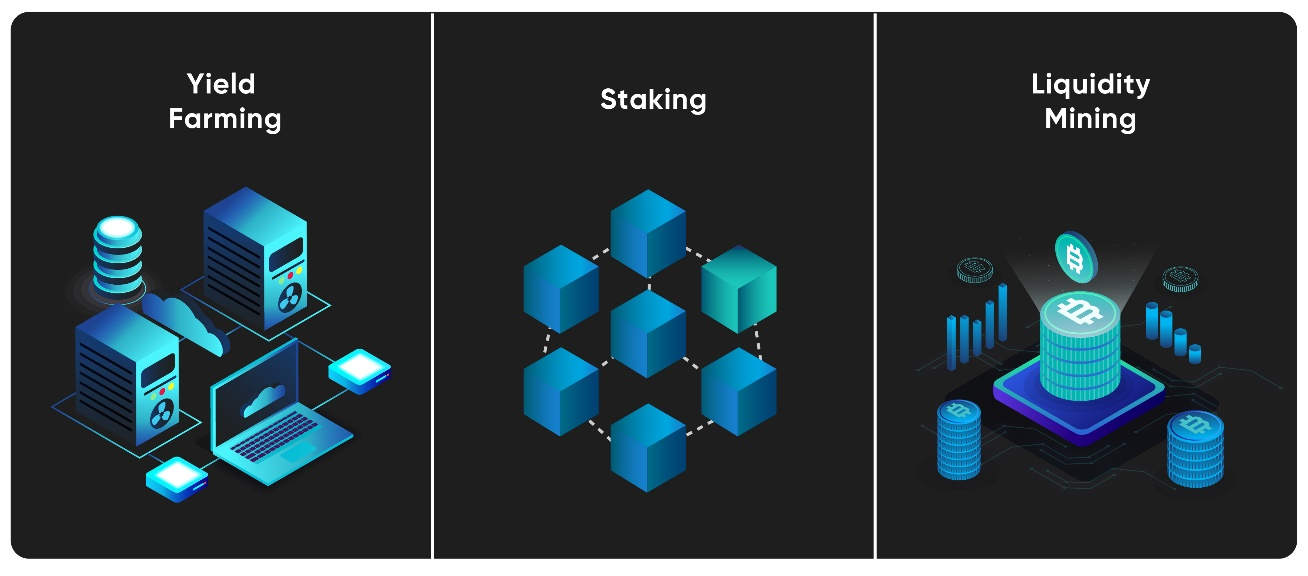
As the digital revolution continues to reshape our world, the concept of wealth accumulation has evolved, giving rise to new opportunities and challenges. Cryptocurrency, once regarded as a fringe asset class, has risen to prominence as a viable investment avenue, promising lucrative returns and opportunities for wealth accumulation.
However, beyond the allure of quick profits and excitement surrounding crypto investments, the question remains: how can investors build a sustainable legacy that transcends market volatility and economic cycles?
Explore everything you need to know about sustainable crypto wealth creation with seasoned digital asset management consultants at Kenson Investments.
The Crypto Landscape
The creation of Bitcoin by Satoshi Nakamoto in 2008 and its subsequent launch in 2009 marked the birth of the cryptocurrency revolution.
Bitcoin introduced groundbreaking concepts such as blockchain technology, decentralization, and digital scarcity, laying the foundation for the cryptocurrency landscape we see today. It also paved the way for a plethora of digital assets, including Ethereum, Litecoin, and a myriad of altcoins.
Explore More: Beyond Bitcoin: Exploring the World of Altcoins
Some Types Of Cryptocurrencies Frequently Chosen For Generational Wealth

Bitcoin (BTC)
As the pioneering cryptocurrency, Bitcoin is often considered a cornerstone of generational wealth strategies. With its limited supply, decentralized nature, and widespread adoption, Bitcoin is viewed as a store of value akin to digital gold. Many investors see Bitcoin as a hedge against inflation and economic uncertainty, making it a popular choice for long-term wealth preservation.
Ethereum (ETH)
Ethereum is a blockchain platform that enables the development of decentralized applications (DApps) and smart contracts. Ether (ETH), the native cryptocurrency of the Ethereum network, is widely used for transactions and as a means of accessing and interacting with DApps. Ethereum’s innovative capabilities and strong developer community have positioned it as a leading platform for decentralized finance (DeFi), making it an attractive option for generational wealth accumulation.
Stablecoins
Stablecoins are cryptocurrencies designed to maintain a stable value by pegging their price to a fiat currency, such as the US dollar (USD) or Euro (EUR). Examples of stablecoins include Tether (USDT), USD Coin (USDC), and Dai (DAI).
Stablecoins offer a reliable store of value and serve as a convenient medium of exchange for trading and transactions within the cryptocurrency ecosystem. They are often used as stable assets within investment portfolios to mitigate the volatility of other cryptocurrencies.
Blue-Chip Altcoins
Blue-chip altcoins refer to established cryptocurrencies with strong fundamentals, widespread adoption, and a track record of performance. Examples of blue-chip altcoins include Litecoin (LTC), Cardano (ADA), and Chainlink (LINK). These cryptocurrencies may offer growth potential and diversification opportunities within a generational wealth portfolio, complementing core holdings like Bitcoin and Ethereum.
Non-Fungible Tokens (NFTs)
Non-fungible tokens (NFTs) represent unique digital assets that are indivisible and cannot be replicated. NFTs are used to tokenize digital art, collectibles, virtual real estate, and other unique assets. While individual NFTs may vary in value and utility, investing in high-quality NFTs with strong provenance and scarcity can potentially create generational wealth opportunities.
Privacy Coins
Privacy coins, such as Monero (XMR), Zcash (ZEC), and Dash (DASH), prioritize privacy and anonymity by obfuscating transaction details and concealing the identities of transacting parties. Privacy coins offer enhanced financial privacy and fungibility, making them attractive for individuals seeking to preserve their wealth discreetly and securely over generations.
Principles of Sustainable Crypto Investing
Diversification
Diversification is a fundamental principle of investment management that applies equally to the cryptocurrency market.
By spreading investments across multiple cryptocurrencies and asset classes, investors can mitigate the risk of significant losses from the volatility of any single asset.
It can help balance risk and reward, as different cryptocurrencies may have different risk profiles, correlations, and growth potential. Additionally, diversifying across various sectors within the cryptocurrency market, such as decentralized finance (DeFi), non-fungible tokens (NFTs), and layer 1 protocols, can further enhance portfolio resilience.
Due Diligence
Due diligence involves evaluating factors such as the team behind the project, the technology, the use case, market demand, and long-term viability.
Investors should scrutinize whitepapers, review project roadmaps, analyze tokenomics, and assess community sentiment to gain a comprehensive understanding of the project’s fundamentals.
Additionally, researching the regulatory landscape and staying informed about potential risks, such as security vulnerabilities or governance issues, can help investors make informed investment decisions.
Risk Management
Implementing sound risk management strategies is crucial for protecting capital and minimizing losses in the cryptocurrency market. Risk management involves setting clear investment objectives, establishing stop-loss orders, and allocating capital prudently based on risk tolerance and investment horizon.
Avoid over-leveraging – invest only what they can afford to lose, and diversify risk across different assets and investment strategies. Additionally, actively monitoring portfolio performance, adjusting allocations as needed, and rebalancing periodically can help investors navigate market volatility and mitigate downside risk.

Long-Term Perspective
Adopting a long-term perspective is key to building sustainable wealth through cryptocurrency investing. While short-term trading and speculation may yield quick profits, building a lasting crypto legacy requires patience, discipline, and a focus on long-term value creation.
Instead of trying to time the market or chase short-term trends, investors should focus on accumulating assets with strong fundamentals and long-term growth potential.
By staying committed to their investment thesis and riding out short-term market fluctuations, investors can position themselves for significant gains over the long term.
Recommended Read: Long-Term Wealth Accumulation Strategies
Strategies for Building a Crypto Legacy
#1- Hodling (Long-Term Holding)
One of the most straightforward strategies for building a crypto legacy is hodling, or long-term holding, of cryptocurrencies. Instead of constantly buying and selling based on short-term price movements, hodlers accumulate cryptocurrencies with strong fundamentals and hold onto them for extended periods, sometimes years or even decades.
Investors can capitalize on the long-term growth potential of cryptocurrencies and benefit from compounding returns over time.
Pros
Simplicity: Hodling is a straightforward strategy that requires minimal active management, making it suitable for investors who prefer a hands-off approach.
Long-Term Growth Potential: By holding onto cryptocurrencies for extended periods, investors can capitalize on the potential for long-term price appreciation and benefit from compounding returns.
Psychological Benefits: Hodling helps investors avoid the stress and anxiety associated with short-term market fluctuations, allowing them to focus on the fundamentals and long-term outlook of their investments.
Cons
Volatility Exposure: Hodlers are exposed to the inherent volatility of the cryptocurrency market, which can result in significant price fluctuations and temporary paper losses.
Opportunity Cost: Hodling ties up capital in illiquid assets, limiting liquidity and potentially missing out on short-term trading opportunities or alternative investments.
Lack of Income Generation: Hodling does not generate income or dividends, unlike other strategies such as staking or yield farming, which may provide additional sources of revenue.
#2- Dollar-Cost Averaging (DCA)
Dollar-cost averaging (DCA) is a disciplined investment strategy that involves regularly investing a fixed amount of capital into cryptocurrencies at predetermined intervals, regardless of market conditions.
With DCA, investors buy more cryptocurrency when prices are low and fewer when prices are high, effectively averaging out their investment costs over time. This strategy helps mitigate the impact of market volatility and removes the need for timing the market, making it ideal for building a crypto legacy with a long-term perspective.
Pros
Risk Mitigation: DCA helps mitigate the impact of market volatility by spreading out investments over time, reducing the risk of investing a large sum of capital at a single point in time.
Discipline: DCA instills discipline in investors by encouraging regular, consistent investment habits, regardless of market conditions, thereby avoiding emotional decision-making based on short-term price movements.
Lower Entry Point: DCA allows investors to take advantage of market downturns by purchasing cryptocurrencies at lower prices, potentially increasing their overall return on investment over time.
Cons
Potential for Missed Opportunities: DCA may result in missed opportunities to buy at the lowest prices or sell at the highest prices, as investments are made at fixed intervals regardless of market fluctuations.
Reduced Flexibility: DCA locks investors into a predetermined investment schedule, limiting their ability to react quickly to changing market conditions or capitalize on short-term trading opportunities.
Transaction Costs: DCA involves making frequent transactions, which may incur transaction fees or trading costs, particularly on platforms with high fees or commissions.
#3- Staking and Yield Farming
Staking and yield farming are strategies commonly used in decentralized finance (DeFi) to earn passive income from cryptocurrencies. Staking involves locking up cryptocurrencies in a wallet to support the operations of a blockchain network and earn rewards in the form of additional coins or tokens.
Similarly, yield farming involves providing liquidity to DeFi protocols by depositing cryptocurrencies into liquidity pools and earning rewards, such as interest or token incentives, in return. By staking or yield farming, investors can generate passive income streams while contributing to the growth and security of blockchain networks.
Pros
Passive Income: Staking and yield farming provide opportunities for investors to earn passive income by participating in blockchain networks or decentralized finance (DeFi) protocols, generating additional revenue streams beyond price appreciation.
Contribution to Network Security: Staking helps secure blockchain networks by incentivizing participants to hold and validate transactions, thereby enhancing network security and decentralization.
Liquidity Provision: Yield farming involves providing liquidity to DeFi protocols in exchange for rewards, which helps improve liquidity in the ecosystem and facilitates efficient trading and lending.
Cons
Risk of Impermanent Loss: Yield farming involves providing liquidity to pools with volatile assets, exposing investors to the risk of impermanent loss if the value of deposited assets fluctuates significantly relative to other assets in the pool.
Smart Contract Risks: Staking and yield farming typically require interacting with smart contracts, which may be susceptible to bugs, vulnerabilities, or exploits, leading to the potential loss of funds.
Complexity and Learning Curve: Staking and yield farming can be complex and require a deep understanding of blockchain technology, protocols, and risks, making them less accessible to novice investors.

#4- Participation in Governance
Another strategy for building a crypto legacy is to actively participate in governance processes within blockchain networks. Many blockchain projects rely on decentralized governance mechanisms, such as voting and decision-making protocols, to determine the direction of development and governance policies.
By holding governance tokens and participating in governance processes, investors can influence the decision-making process, propose and vote on protocol upgrades, and earn rewards in the form of governance tokens. This not only provides investors with a voice in the future of the project but also offers additional incentives for holding and staking their tokens.
Pros
Influence and Control: Participating in governance allows investors to have a voice in the decision-making process and influence the direction of development, upgrades, and policies within blockchain networks or decentralized protocols.
Rewards and Incentives: Governance participants are often rewarded with governance tokens or other incentives for their contributions, such as voting, proposing, or implementing changes to the protocol.
Alignment of Interests: Governance aligns the interests of investors with the long-term success and sustainability of blockchain networks or protocols, fostering community engagement, trust, and collaboration.
Cons
Voting Costs: Participating in governance may involve transaction fees or costs associated with voting, proposing, or delegating tokens, particularly on networks with high congestion or gas fees.
Complex Decision-Making: Governance processes can be complex and require a deep understanding of protocol governance mechanisms, voting procedures, and potential implications of proposed changes.
Centralization Risks: Governance participation may be dominated by a small number of large token holders or entities, leading to centralization of power and decision-making within the network, potentially undermining decentralization and censorship resistance.
#5- Asset Preservation and Estate Planning
Finally, asset preservation and estate planning are essential considerations for building a crypto legacy. Cryptocurrencies are digital assets that require robust security measures to protect against theft, loss, or unauthorized access.
Investors should utilize hardware wallets, multi-signature wallets, and secure storage solutions to safeguard their private keys and digital assets. Additionally, incorporating cryptocurrencies into estate planning strategies ensures a smooth transfer of wealth to future generations.
By establishing clear inheritance plans and providing heirs with access to digital wallets and recovery information, investors can ensure that their crypto legacy is preserved and passed on to their loved ones in a secure and efficient manner.
Pros
Security and Protection: Asset preservation and estate planning strategies help protect crypto assets from theft, loss, or unauthorized access by utilizing secure storage solutions, hardware wallets, multi-signature wallets, and other security measures.
Inheritance and Legacy: Incorporating cryptocurrencies into estate planning ensures a smooth transfer of wealth to heirs and beneficiaries, preserving the investor’s crypto legacy and ensuring that assets are passed on securely and efficiently to future generations.
Peace of Mind: Asset preservation and estate planning provide investors with peace of mind, knowing that their crypto assets are safeguarded and their legacy is protected, regardless of unforeseen circumstances or events.
Cons
Complexity and Legal Considerations: Asset preservation and estate planning for cryptocurrencies can be complex and require careful consideration of legal, regulatory, and tax implications, as well as the implementation of appropriate legal instruments, such as wills, trusts, or digital inheritance solutions.
Risk of Loss or Access Issues: Failure to properly secure private keys or recovery information may result in the loss of crypto assets or difficulties accessing them in the event of incapacitation or death, highlighting the importance of robust security practices and contingency planning.
Regulatory Uncertainty: Cryptocurrency regulations vary by jurisdiction and may change over time, creating uncertainty and legal challenges for estate planning and inheritance of crypto assets, particularly in the absence of clear legal frameworks or precedents.

Practical Tips and Advice for Building a Crypto Legacy
Set Clear Investment Goals: Take the time to define your investment goals, risk tolerance, and time horizon. Are you looking to build long-term wealth, generate passive income, or speculate on short-term price movements? Understanding your objectives will help guide your investment strategy and decision-making process.
Do Your Own Research (DYOR): Conduct thorough research and due diligence before investing in any cryptocurrency. This includes evaluating the project’s whitepaper, team members, technology, use case, community engagement, and market demand. Avoid relying solely on hype or recommendations from others and make informed decisions based on your own analysis.
Start Small and Diversify: Start with a small amount of capital that you can afford to lose and gradually build your portfolio over time. Diversify your investments across different cryptocurrencies, asset classes, and investment strategies to spread out risk and maximize potential returns. Avoid putting all your eggs in one basket and maintain a balanced portfolio.
Stay Informed and Stay Safe: Stay informed about market trends, technological developments, regulatory changes, and security best practices. Keep up-to-date with industry news, follow influential figures in the crypto space, and engage with the community to expand your knowledge and stay ahead of the curve.
Additionally, prioritize security by using reputable exchanges, implementing strong passwords, enabling two-factor authentication (2FA), and utilizing hardware wallets or cold storage for long-term storage of funds.
Manage Your Emotions: Emotions can cloud judgment and lead to impulsive decision-making in the volatile cryptocurrency market. Stay disciplined and avoid making decisions based on fear, greed, or FOMO (fear of missing out). Stick to your investment plan, remain patient during periods of market volatility, and avoid chasing short-term gains at the expense of long-term success.
Keep Track of Your Investments: Keep detailed records of your cryptocurrency investments, including purchase prices, transaction dates, quantities, and wallet addresses. Use portfolio tracking tools or spreadsheets to monitor your portfolio performance, track profits and losses, and assess the effectiveness of your investment strategy. Regularly review and adjust your portfolio as needed based on changing market conditions or your evolving investment goals.
Stay Patient and Stay Consistent: Building a crypto legacy takes time, patience, and consistency. Stay focused on your long-term goals, ignore short-term noise and fluctuations, and resist the temptation to chase quick profits or engage in speculative trading. Stick to your investment plan, continue to educate yourself, and remain committed to your journey of building generational wealth through cryptocurrency investments.
Seek Professional Advice When Needed: Consider seeking professional advice from financial advisors, tax professionals, or legal experts who specialize in cryptocurrency investments. They can provide valuable insights, guidance, and expertise to help you navigate the complexities of the crypto landscape, optimize your investment strategy, and ensure compliance with relevant regulations and tax laws.

Stay Informed and Ahead with Kenson Investments: Your Gateway to Digital Asset Knowledge
Are you ready to stay ahead in the rapidly evolving world of digital assets? At Kenson Investments, our dedicated digital asset specialists are committed to keeping you informed about the latest developments in cryptocurrencies, real-world assets, and various digital assets. In an industry that moves at lightning speed, staying updated is crucial to navigating the landscape with confidence and making well-informed decisions.
Our team brings you timely insights and trends, helping you understand the complexities and opportunities within the digital asset market. From the nuances of blockchain technology to the latest advancements in decentralized finance, we ensure you have access to comprehensive, accurate, and relevant information.
By joining the Kenson Investments community, you’ll gain access to a wealth of knowledge and resources designed to enhance your understanding and keep you at the forefront of this dynamic market. We offer blockchain asset consulting, blockchain and digital asset consulting, and digital assets consulting to provide you with comprehensive insights and strategies.
Additionally, our digital asset management consultant services and digital asset investment solutions empower you with the tools and insights needed to confidently explore the world of digital assets, including altcoin investment options and guidance from bitcoin investment consultants.
Don’t let the fast-paced nature of the digital asset market leave you behind. Connect with us today and stay informed with Kenson Investments. Embrace the future of finance with clarity and knowledge. Our cryptocurrency investment consultant services and real world asset consultants ensure you have all the expertise required. Join us now and take the first step towards mastering the digital asset landscape.
Disclaimer: The information provided on this page is for educational and informational purposes only and should not be construed as financial advice. Crypto currency assets involve inherent risks, and past performance is not indicative of future results. Always conduct thorough research and consult with a qualified financial advisor before making investment decisions.
“The crypto currency and digital asset space is an emerging asset class that has not yet been regulated by the SEC and US Federal Government. None of the information provided by Kenson LLC should be considered as financial investment advice. Please consult your Registered Financial Advisor for guidance. Kenson LLC does not offer any products regulated by the SEC including, equities, registered securities, ETFs, stocks, bonds, or equivalents”














